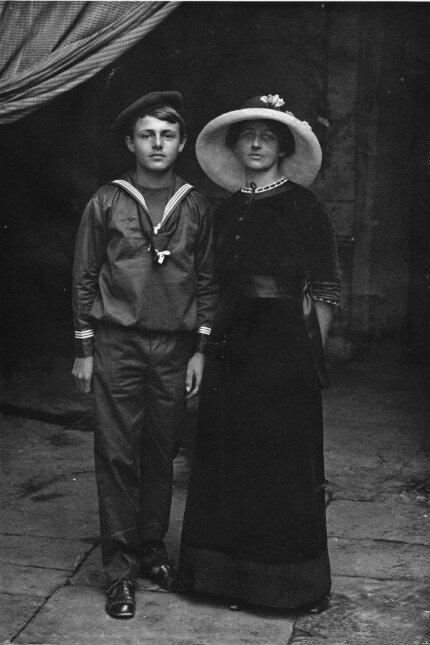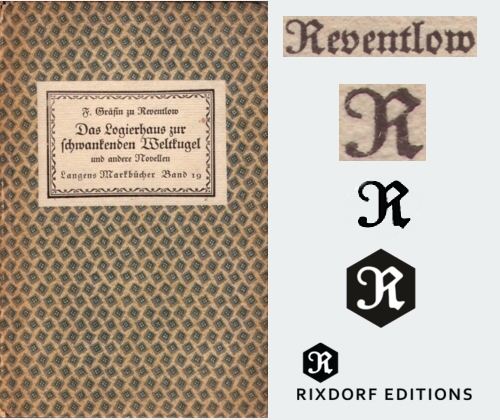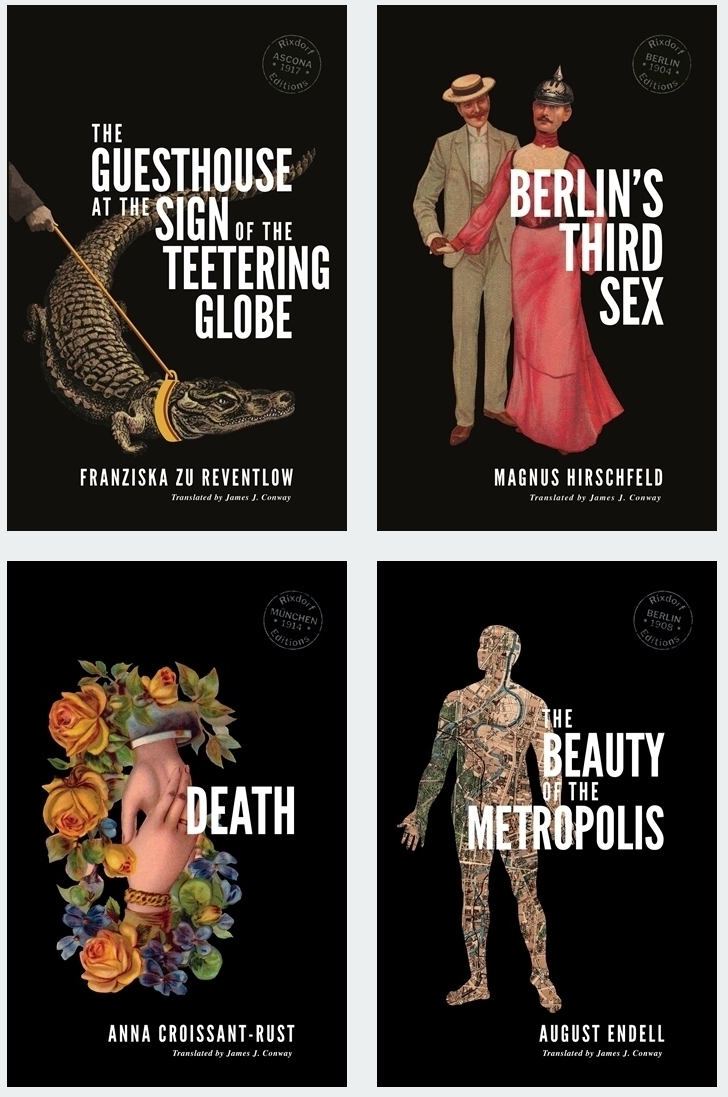Franziska zu Reventlow was born 150 years ago today in Husum, on Germany’s North Sea coast. Her story – aristocrat born in luxury who ran away from her family to dwell among the ragged bohemians and live a life of daring, free love and independence before dying young in exile – is irresistible. She was captured in numerous contemporary and retrospective accounts and also appeared lightly fictionalised in a number of prose works – including her own, such as The Guesthouse at the Sign of the Teetering Globe, which I translated in 2017.
One of the most interesting profiles of the Countess comes to us from the anarchist writer Erich Mühsam, published as a newspaper article in 1928 then collected in his memoirs in 1931. While fragmentary, it is particularly valuable because Mühsam, uniquely, knew Reventlow in all three major stations of her life – Lübeck, Munich and Ascona, Switzerland. Mühsam was born in Berlin but like Reventlow, he moved to Lübeck with his family in infancy. Like her, too, he gravitated to bohemian Munich in the closing years of the 19th century. And, like her and a number of other idealistic refuseniks from Germany and beyond he ended up in Ascona prior to World War One. Hermann Hesse, Hugo Ball, Isadora Duncan, Paul Klee, Mary Wigman and Max Weber were all in Ascona and its proto-hippy ‘Monte Verità’ colony at one time or other. One of the most eccentric figures of this community features, briefly, in Mühsam’s text – Otto Gross, the pro-matriarchy, polyamorous neo-pagan bohemian, coke addict, anarchist, psychiatrist cum psychiatry patient. And it was in Ascona and through Gross that Mühsam, as he relates, was instrumental in the absurd episode of Reventlow’s second marriage, which she fictionalised in her novel Der Geldkomplex (The Money Complex).
Mühsam was serving time in prison for pacifist agitation when Reventlow died, in the last summer of World War One. Less than a year later, in 1919, he was involved in the extraordinary ‘Räterepublik’, when a group of writers and utopians established a socialist government in Bavaria (see Volker Weidermann’s Dreamers for more). It lasted only a few weeks but earned Mühsam a much longer prison sentence; he was finally released in the 1924 amnesty which also put Adolf Hitler back on the streets.
As a Jewish anarchist who had been instrumental in a left-wing takeover, Mühsam was high on the Nazis’ hit list when they came to power in January 1933. The Reichstag fire the following month signalled a new intensity in persecution of the new regime’s enemies; the parliament building was literally still smouldering when Mühsam was arrested. Over months he was subjected to horrific torture and finally executed in July 1934.
Erich Mühsam
The Countess
translated by James J. Conway
As children we had been neighbours. But in Lübeck, Franziska zu Reventlow was no more a playmate of mine than her brothers. We knew each other by sight, I knew that the old count had been in Schleswig’s Landdrost until the Prussians deposed him in 1864. It was said that he remained entirely Danish in disposition and withdrew to non-Prussian Lübeck in protest against the annexation of Schleswig-Holstein. But this may all be small town gossip. In any case, I remember that such things were said of Count Reventlow. The Countess, his daughter, never confirmed it to me; nor did I ever ask her anything of the sort. Anyone interested in the family history of the Reventlows should read the Countess’s autobiographical novel Ellen Olestjerne, a book which incidentally she did not enjoy being reminded of; ‘sentimental rubbish,’ she called her début.
The young Franziska zu Reventlow
From my high school days I very clearly remember the dazzlingly beautiful blonde seminarian whom they used to refer to then as ‘Komtesse Reventlow’. She walked the same route to school as me, so I saw her every day and greeted her politely – whether out of an early suscepitiblity to feminine charms – the Countess was, after all, several years older than me – or out of respect for her fine, noble name, which critical experience had not yet driven out of my fifteen-year-old self, I can no longer say. What is certain is that the admiration was entirely one-sided and it was only about twelve years later that I finally confessed the puerile sentiments of distant veneration to their object.
Café Luitpold, Munich
I don’t remember exactly how our acquaintance came about in Café Luitpold in Munich; I probably sat down with friends of hers and she joined them, or it may have been the other way round, that Maya or someone else who appeared in the Countess’s diaries dragged me to her table. Our shared home town provided material for all sorts of amusing reflections, and I believe it was at our very first meeting that the Countess told me that those of us from Lübeck who were scattered across the fields of literature, art, and bohemia were the subject of anxious conversation at an evening hosted by the mayor of our town. Thomas Mann had grievously offended Lübeck’s decency with Buddenbrooks, Heinrich Mann with Professor Unrat, Fritz Behn was not yet a professor and, he too the offspring of a senatorial family, had thrown himself into the poor man’s art of sculpture, and even Reventlow, a countess, was the mother of an illegitimate child, and I not only wrote highly immoral poetry, but was also a propagandist for anarchism and had preoccupied the police and the public prosecutor – it was a lot all at once, and His Magnificence, as the Countess had heard from an ear witness, was most concerned by this woeful state of affairs; shaking his head sadly he said: ‘That they all should be from Lübeck – what must the people in the Reich think of us!’
The young Erich Mühsam
As for the Countess, it was of absolutely no account to her what people in the Reich, people in Lübeck, and especially people of the caste from which she came might think. She went her way and lived as it suited her and as she believed she owed to her life’s work. This life’s work, however, was focused almost entirely on caring for and bringing up her child. Among all the rich qualities that distinguished Franziska zu Reventlow, her wondrous courage in facing life despite eternal illness, eternal misfortune and agonising poverty, the way she subjected her words and deeds solely to the laws of her own moral conscience as a matter of course, unconcerned about conventions and social prejudices, the energy for work which enabled her to do simple sewing work one day, glass paintings the next, and in between precious translations from French and to write her superior, humorous, stylistically excellent novels – among all these virtues, the woman’s spiritual stability rested entirely on her motherly love. Admittedly, she was far too hungry for life and artistically animated not to surrender to the whims of her sensual desires without hesitation, with a character that was far too cheerful not to disregard the vexatious misery of existence with incomparable ease, exuberance even. But she drew her inner happiness solely from the riches she gained from the growth, from the physical and mental prosperity of her child, her Bubi. It is only from her diaries that one learns the pain to which the high-spirited heart of this mother was subject, what turmoil of longing every brief separation from the child aroused in her. I believe that the amicable favour the Countess showed me through all the years of our acquaintance was essentially a reflection of the joy that working with children inspires in me and which earns me the trust of all children. The friendship that tired little Rolf extended to me was shared by his mother and I fulfilled the role of father confessor in her many hardships and worries, as witnessed by numerous letters which I keep which reach back to 1907.
Reventlow and son Rolf (‘Bubi’)
In the letters there is much talk of the ‘good Lord’. Under this umbrella term the Countess collected everything that made her life bitter: illness, debts, misfortune of all kinds; and I have scarcely known anyone so incessantly pursued by misfortune as this woman, who truly deserved every joy, possessed to the point of genius as she was by the ability to enjoy and utilise happiness. I think wistfully how she sat in her room for weeks, hundreds of glasses all around her, decorating them with painted landscapes of Oberammergau, the theatre, the most touching scenes of the Passion of Christ and other pious things. She had come up with the idea of relieving her hardship by selling souvenirs at Oberammergau where the Passion Play was imminent. She did in fact go there, sitting in a wooden booth in front of the theatre from morning to evening, waiting for the American millionaires who would buy her glasses. But it rained the whole time, and besides, the souvenirs were far too cheap for rich people to buy. So she came back to Schwabing with almost the whole stock and increased debt. The Countess could no longer stand the sight of the glasses which had been completely devalued by painting, so she decided to drown them in all their splendour. She hired a boat in the Englischer Garten, rowed to the middle of the Kleinhesseloher See and was about to launch the massive package with the Passion glasses overboard when a park attendant appeared and yelled at her that dropping objects in the lake was forbidden, with a high penalty. The fact that she could not even carry out the death sentence on the souvenirs crushed the poor Countess even more than the whole failure of Oberammergau.
Reventlow in Munich
In my publication ‘Ascona. A Brochure’ I dealt extensively with one of the most peculiar personalities who enlivened the beautiful landscape there on Lake Maggiore. He was a Baltic baron named Rechenberg, a huge fellow who had lived a bold sailor’s life all over the world and as a gold panner in the Urals, had completely lost his hearing on some adventure or other and stood out from the abstinent vegetarians in particular because he devoured enormous amounts of meat at every meal and was constantly drunk. This man dearly loved an Italian washerwoman who, however, wished to have nothing to do with the deaf drunkard because she lived quite happily with her husband. Rechenberg had a wealthy father who still lived in his native Courland and he was constantly calculating how he would change his life when he eventually came into his inheritance, which he estimated at around two hundred thousand marks.
Alexander von Rechenberg-Linten
In the last years of her time in Munich, Countess Reventlow’s circle of friends included the psychoanalyst Dr. Otto Gross and the economist Professor Edgar Jaffé, who later became finance minister in Eisner’s revolutionary government. Gross wanted to help the Countess, in his ingenious and fascinating way, by having her view all of her worries and suffering as the effect of mental complexes and thereby dissolve them; Jaffé offered her a position as private secretary. She fluctuated, back and forth, between the strong impressions of psychoanalysis, which she ironised most humorously, as well as the prospect of maintaining a stable existence on the one hand, and on the other an offer to take up a position as a cashier at an art exhibition in Paris that would to some extent slake her thirst for experience. In the end she decided to go to Paris. During this time – around the autumn of 1910 – a friend of mine arrived in Munich from Ascona and told me the following: the father of Baron Rechenberg had just set up in Ascona and wished to see his son married. This apparently gave Rechenberg junior the idea of helping the beloved washerwoman, as he could not have her, by making her little daughter his heir. Under Russian law, if he died unwed his father’s inheritance would pass to his siblings after his death. But if he were married, he would have testamentary disposition. So Rechenberg apparently wanted him to ask me whether I knew a woman who might like to enter into a fictitious marriage contract with him. As soon as he took over the inheritance, she would receive half of the property immediately, but could not make any claims on the other half, which would be reserved for the washerwoman’s child. Naturally there would be no further obligations arising from the marriage.
When I heard the proposal, I immediately cried: ‘The Countess!’ I had said goodbye to her that morning because she was going to leave for Paris the next day. I rushed to her apartment immediately and left her a note stating that she had to come and see me. She came in the evening.
Monte Verità
‘You know what, Countess,’ I said, ‘you’re going to be a baroness.’ – ‘You must be crazy,’ she replied, and then I explained the story to her. ‘What’s the chap’s name?’ she asked after a moment’s thought, and then said: ‘Rechenberg is very practical. I won’t even need to re-stitch the monograms on my handkerchiefs.’ She instructed me to investigate the legal situation under Russian law, to get in direct contact with the Courlander and to do everything that might further the cause. She left, and I went to work, glad of the chance to help the most precious woman I knew out of poverty and failure once and for all, while at the same time creating a comfortable future for a poor Italian child of the proletariat and gladdening the heart of the well-meaning drunkard.
Erich Mühsam
It may suffice to know that the marriage actually took place. The Countess described the ceremony in the church at Locarno in a charming letter; she appeared in a beach dress, her husband in a sailor’s uniform, and her father-in-law in a frock coat and top hat; he had no idea that the whole thing was a farce and was overjoyed that his failure of a son had even been bagged a real Countess. By the time he found out what was behind the marriage, it was too late.
Then – I think it was in 1912 – I received a card stating that the inheritance was due. ‘I hope the harvest isn’t bad.’ Well, there were long proceedings and finally not hundreds of thousands, but around four thousand francs, still a fabulous sum for the Countess.
Mühsam (r.) and bohemian friends in Ascona.
What happened next the happy heiress herself hinted at in her sumptuous novel The Money Complex. In a letter to me in which she reported the episode, she complained merely of her own folly in the fact that for the first time in her life she had done something that was perfectly, correctly bourgeois, namely, handing the money over to a bank. She went to Nice with a small sum. From there she quoted from an alarming telegram, and when she arrived in Locarno, the bank, one of the most important Swiss institutions, had just collapsed and the entire inheritance had gone to the devil. ‘There doesn’t seem to have been a blessing attached to the money,’ she said ruefully in her letter to me, but at the same time felt the whole story was very much in keeping.
Reventlow in Ascona, shortly before the First World War
After that I only saw the Countess once, when the war was already under way. Her marriage made her a Russian and therefore an ‘enemy alien’. Now she came to me and complained that her boy, who was sixteen at the time, wanted to sign up. ‘He thinks the war is Cowboys and Indians,’ she said disconsolately. Fortunately her Bubi wasn’t accepted at the time, and when he was conscripted two years later the brave Countess outdid herself in maternal love by bringing him to safety at her own risk. How that transpired, however, does not belong in my memoirs, least of all apolitical memoirs.
Rolf, Franziska zu Reventlow
In the summer of 1918, when I was interned in Traunstein, I received the news that Franziska zu Reventlow had died. It was hard to believe. This dead woman I greet with deep admiration. Except for her name, nothing about her was undermined by the mustiness of the past. Her life, her vision, her thinking were directed towards the future; she was someone who knew the meaning of freedom, a person without prejudice, without fetters of tradition, with no diffidence before the philistinism of her surroundings. And she was a joyful person whose joy came from the most profound gravity of character. When she laughed, her mouth and her whole face laughed, and it was a pleasure to behold. But her eyes, her large, deep blue eyes, remained grave and immobile amid her laughing features. The Countess was a beautiful woman, with radiant physical appeal, and her heart was filled with the longing for a beautiful, free human existence.
‘The Countess’ by Erich Mühsam was first published in German as ‘Die Gräfin’ in the Vossische Zeitung, Berlin, no. 295, 24 June 1928; first book publication in Unpolitische Erinnnerungen by Offizin Haag-Drugulin, Leipzig, in 1931.
This translation © 2021 James J. Conway























